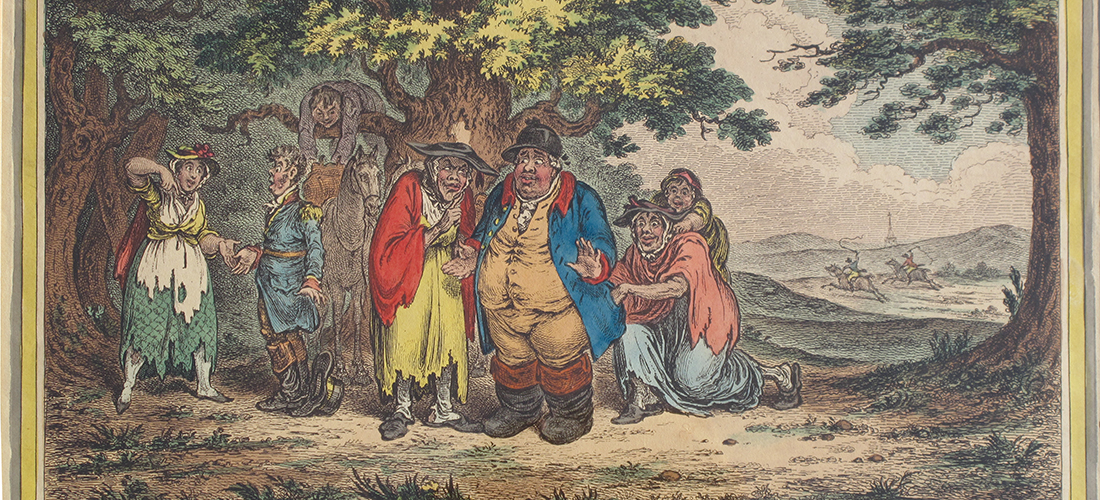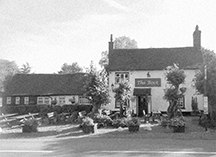
A not so quiet day in the country
Fiction by A.J. Rothwell

Lord Blenkinsop was a good man. Good family. Acquaintance of the king. Wide of girth. Not the sharpest knife. Took his responsibilities seriously, though, always had.
One of them being the further education of his nephew Nigel Carruthers.
When he was 19, Nigel’s courageous Royal Naval father, Captain William Carruthers, had been killed by a musket ball on his own poop deck while serving His Majesty on the sloop HMS Orion, fighting the French off Brest. “Damn that little shrimp Boney and his dastardly ambitions,” muttered His Lordship at Carruthers’ funeral as the service wore on. And that is when, in an instant, he decided that it was his solemn duty, in loco parentis, so to speak, to make sure Nigel was schooled in the ways of the world.
With no children of his own he had always taken an interest in the boy, who he felt had lived a rather sheltered life, as it were, fencing and dancing instructors, if you please. The result was that he had few friends of his own age with whom to get out and about.
When Blenkers (as he was affectionately known in the family) put the idea to Marjorie Carruthers she agreed wholeheartedly — the tutoring had been her husband’s idea and had severely restricted her social life, as it required her to be at home rather than out with the fashionable set to which she felt she belonged, a ruse of the oft-absent Captain. But now that her husband had departed this mortal coil, Blenkinsop’s notion suited her down to the ground: She needed to see and be seen in society, even if her attire was, temporarily, mourning black.
His Lordship planned an agenda for the proper instruction of a young man entering London society. First he took him to his club, where he had his first proper taste of alcohol, a brandy no less, reading The Times in a large leather armchair after a good lunch — quite the gentleman about town. On another day they went to a coffee shop, a place of male intrigue if ever there was one, concluded Nigel; it appealed to him a great deal, and he entered into some interesting conversations. On another it was off to the House of Commons, where shouting down the current speaker seemed to be the order of the day, but where again he took a keen interest in the proceedings. In the evenings they visited a tavern or two, where he evinced quite a deal of attention from the ladies, unused to seeing young men in their teens in city inns.
The longer this “education” went on the more Nigel seemed to be enjoying it. He was getting a taste for ale and brandy, and His Lordship was very pleased with the way the programme was proceeding and with the boy’s keen interest and sharp mind. “Blossoming, if you ask me,” reported Blenkinsop to Marjorie Carruthers, “like a bottle long-stoppered, finally released!” She’d noticed the change too and was all for it — the more he was his own man the more freedom she would have.
Next it was to be the country, for they were “cits,” and if you were a cit it was fashionable to spend time getting back to your roots by going out to the country — riding, hunting and mixing with the country folk. “Salt of the earth,” Lord B proclaimed to Nigel, “not used to the ways of London, but happy with their lot. Hearts of oak don’t you know. They’d give you the shirt off their back. I’ll take you out as my groomsman and show you the ropes.”
On the appointed day for their country excursion, Lord B hired a post chaise, which took them, already regaled in their equine garb, to Sarratt in Hertfordshire and to The Boot Inn, where decent hunting horses were to be had by the day for a few shillings. The vicar of Sarratt was an old acquaintance of His Lordship and had spoken glowingly of the countryside around the village. They looked quite a pair — Lord Blenkinsop being, let us say, rotund and dressed in traditional hunting clothes straining at the seams, while Nigel was as thin as a rake and attired in a baggy blue groom’s coat and wide-brimmed hat — not exactly the country squires they hoped to be taken for.
They duly arrived at The Boot, ordered two horses to be saddled, and after a pint of ale and some bread and cheese, they mounted up. Using a rough map the landlord prepared for them with a recommended route, they made their way past the church until they were able to break off into the fields and copses.
They spent the next hour or so pretending to be huntsmen, shouting “tally-ho,” chasing after imaginary foxes and wishing they had guns whenever a pheasant got up in front of them. Following the map, they eventually started to head back to the village when the horses suddenly set back their ears and made for a stand of trees some way off at a good gallop. In spite of their best attempts to slow them down, the horses kept to their course, and before long, arrived among the trees where they came to a halt in a clearing. The would-be huntsmen, who couldn’t understand what had gotten into the horses, dismounted to get their breath back, and as they did so, an old lady and a good-looking young wench, both dressed in ragged clothes, emerged from the trees and started to feed apples to the horses.
As they did, the old lady spoke: “What you be doin’ ’ere, sur?
“If you must know, we’re just out from London, taking the air and getting a little exercise,” said Blenkinsop rather testily, unused as he was to being questioned by someone dressed in rags.
“You be trespassin’ on those ’orses, sur,” said the old lady. “This be crown land, belongin’ to the king you understan’, only folks on foot ’ave roight o’ way ’cross it.”
“Oh, dear,” said His Lordship, now looking distinctly flushed.
“But we don’t ’ave to report it to no one under certain circumstances,” the old lady continued, half closing one eye and raising a crooked finger to make her point.
“And what would those circumstances be?” asked Lord B.
“Well, let me see now,” said the old lady, “how about you press some silver into my palm and I’ll tell your fortune, and Mary here will tell your young friend’s and we need never say nothing more ’bout it.”
“I suppose that would be all right,” said Blenkinsop, softening, as he had no desire to do anything that would put him in bad odor with His Majesty, to whom he owed his peerage. “How much would you suggest?”
Not the best question, for it gave the old lady the upper hand.
“Well, let’s see,” said she. “I should think a couple o’ guineas should cover the situation.”
“Two guineas!” exclaimed Blenkinsop, turning red in the face. “That’s highway robbery, ma’am, and you know it!”
“Do I? Do I, now?” said the old crone. “Well, suit yerself. We’ll just ’ave to report yer then, won’t we?”
“That won’t be necessary,” said His Lordship, who knew when he was on the losing end of a bargain from a lifetime of experience, “but these fortunes better be good.”
During this exchange Nigel had been ogling the young girl, who had gained his complete attention. She was the comeliest girl he had ever seen, and she was also showing an interest in him. Unfortunately for our heroes, they had not noticed that, while thus distracted, a third gypsy was hanging down from a tree and rifling through the portmanteau on the back of Blenkinsop’s horse while a fourth was expertly picking his pockets.
Meanwhile, the old lady held out her hand to Lord B, who reluctantly took out the necessary coinage from his waistcoat pocket. She carefully counted the money and told the wench — Mary, she called her — to get started.
The young girl took Nigel’s hand. “That’s an intrestin’ palm if ever oi saw ’un,” said she. “Let’s see now. Yer’ll ’av a long loif, sur, an’ yer’ll be lucky in luv an’ be blessed wi’ many healthy chillen. That’s all oi see there.”
“Is that it?” exclaimed Lord B. “That’s about a shilling a word! Is that the best you can do?”
The old lady chimed in, “If oi were you, sur, I’d remember wot oi said about trespassin’ on the king’s land an’ count moiself lucky. Now let’s see yer palm.”
“Come on, Nigel, I’m not waiting to hear what rot they have to say about me,” said His Lordship, resigned to having been taken advantage of. “Let’s leave these witches and get back to the inn and wash the taste of them out of our mouths.”
“Wery noice sentiments, oi must say,” said the old lady. “Be off wi’ yer then an’ take more care where yer go nex’ toim.”
The horses, it seemed, had had their fill of apples and were content to take their riders back to the The Boot, with Nigel occasionally looking back to see if he could get a last glimpse of the girl — he could still feel her hand holding his — but she had disappeared. They arrived at the tavern and looked for the landlord to tell him what had happened, but he was nowhere to be seen. They told the coachman to load their belongings into the post chaise and stand guard, ordered their ale from a serving girl and fumed over their expensive experience.
After a while they began to relax, deciding to order another ale “for the road,” and Lord B finally saw the funny side of their outing when Nigel commented on his statement about country folk giving them the shirts from their backs.
“More like we lost our shirts,” guffawed Lord B, a typical Blenkers attempt at humour. “Time to go. Your mother will be wondering what’s happened to us.”
“I’ll need to relieve myself for the journey first, Uncle,” said Nigel.
“Off you go then, I’ll settle up. See you in the coach.”
Nigel made his way across the inn’s courtyard and ’round behind the stables to the privy, but as he was standing there he heard muffled voices from inside. In disbelief he thought he recognized the old lady’s scratchy voice. Could it be, he thought, and leant closer to the wall.
“Oh yes, we took ’em proper” she was saying. “You trained them ’orses well, Jim — came straight to us, didn’t they, Mary? They luv them apples! Two guineas in my palm and Billy ’ere got two pocket watches with chains and our Sal got a couple o’ silk kerchiefs. ’Ere’s yer share and good luck to the lot o’ us!”
By this time Nigel had crept round the front of the building, grabbed a pitchfork leaning up against the wall, and threw open the door, shouting, “Caught you red-handed, you scoundrels! You’re not getting away with this! Do you know that’s Lord Blenkinsop you just robbed, a confidente of the king himself, whose name you just took in vain out there in the woods — probably a hanging offence!”
With which he leveled the pitchfork at the landlord’s throat as though it was a rapier and said, “Put all the money and the watches in the handkerchiefs and tie them up and hand them over.” He made a jab with the pitchfork to show he meant business. The landlord flinched, and with trembling fingers did as he was told. He had gone white, while the women just stood there, their mouths gaping open.
“Now the next part is up to you,” Nigel said looking at them one by one. “We can either have a constable come out here and have you all arrested and locked up, if you’re not hung, or you can solemnly swear that you will discontinue this loathsome practice here and now.”
This statement was greeted with silence other than the sound of the old lady wringing her hands and moaning and the landlord’s knees knocking. “Very well, I shall call my uncle and he will take the matter over.”
“No, no, no,” said the landlord, looking at the others, who nodded vehemently in agreement. They knew the penalties for what they were doing and it sounded like they were going to be given a second chance. “That won’t be necessary, young sir. We were misguided. Very misguided. We’ll stop today, here and now, we swear. On the Holy Bible. Don’t we, ladies?”
“Yes. Yes.” they said, out of very dry throats.
“Very well,” said Nigel, “but to make sure you do, Lord Blenkinsop will write a letter to his friend the vicar here and tell him what has transpired today, that you have sworn to stop your thievery, but that if he hears anything to the contrary he is to contact us and we will put the wheels in motion for you all to be arrested. Good-bye to you and I hope I never have to see your faces again.”
One last look at the girl, who didn’t know whether to be impressed or furious, and Nigel was gone, climbing into the coach. Seconds later they were out of the courtyard and on the road back to London when His Lordship asked, “Do you usually take so long to relieve yourself, my boy? I wondered what had happened to you.”
Nigel’s reply was to ask him to open his hands. “Playing a game, are we?” he inquired.
“You’ll see, Uncle,” said Nigel, then pulled out the handkerchiefs from his pocket and untied them.
“Good lord,” said his uncle, “there’s my money — and our watches! Where did they come from?”
Nigel recounted the whole story to an astonished member of the peerage. Blenkers wasn’t sure if his nephew had made the right decision about letting them off so lightly, but he was impressed with the young man’s quick thinking and courageous action.
“Your father would have been very proud of you, as am I,” he said. “Swift, decisive action. Definitely a chip off the old Carruthers block!”
“And to think I was taken with that girl back there,” said Nigel, shaking his head.
“A part of your education I hadn’t reckoned on, I must say,” replied Lord B with a wry smile.
The poste chaise eventually arrived back at the Carruthers residence after a most interesting, and as it turned out, exciting day.
“Do we tell your mother?” asked His Lordship.
“Let’s just tell her we’ve had a good day fortune hunting, eh, Uncle? What’s on the agenda for tomorrow?” PS
A. J. “Tony” Rothwell moved to Pinehurst in 2017, exchanging the mind-numbing traffic of Washington, D.C., for the vagaries of golf. He spent 50 years in the hotel business but in retirement collects caricatures, writes short stories, sings in the Moore County Choral Society and, with his wife Camilla, enjoys the many friends they have made in the Sandhills.
Fact and Fiction
Captain Carruthers would have been on blockade duty off Brest, intended to stop French ships getting in or out of harbour. It was long and tedious duty but every now and again one or more ships would take a chance and a sea battle would ensue if they were spotted. Both the French and the English employed snipers with muskets in the top rigging to shoot officers with the objective of weakening the resolve and organization of the opposing force.
The king referred to is George III, known affectionately by his subjects as Farmer George from his rather bucolic manner of speech.
There is to this day an inn called The Boot in Sarratt, Hertfordshire, built in 1739, some 40 years before the setting for this story.
“Cits” ( a slang name for people who lived in the city of London at the time of the setting for this story) had a hankering for the pursuits and clean air of the countryside, for much of London was squalid, unsavory and smoky. Further evidence of this is that two of the most popular painters of the day were George Stubbs, who specialized in horses, and George Morland, who painted rustic scenes.
Robbery was punishable by hanging, especially if violence was involved, in the 18th and early 19th centuries.
“Fortune Hunting” is an original print, engraved by the great caricaturist James Gillray from a sketch by Brownlow North who would bring ideas to Gillray so that he could have prints run off to give to his friends. It was hand-colored and published in 1804.
As for the rest — pure fiction.





